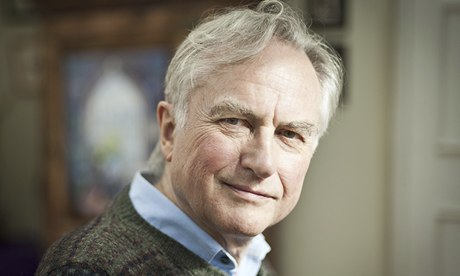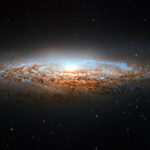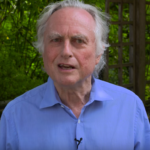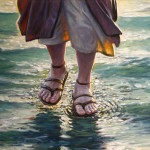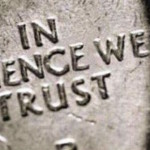Is Richard Dawkins Close to Christianity?
by Dr. William Oddie
Filed under New Atheists
A few weeks ago, The Telegraph published a Letter to the Editor from around 50 leading atheists in England, predictably including such names as Philip Pullman, Peter Tatchell, Polly Toynbee, Anthony Grayling, and Evan Harris.
It began as follows: “Sir – We respect the Prime Minister’s right to his religious beliefs and the fact that they necessarily affect his own life as a politician. However, we object to his characterization of Britain as a ‘Christian country’ and the negative consequences for politics and society that this engenders…. Britain is not a ‘Christian country’. Repeated surveys, polls and studies show that most of us as individuals are not Christian in our beliefs or our religious identities.”
One name, however, among those listed beneath the Letter was conspicuous by its absence: that of the most famous atheist of them all: Richard Dawkins. How come?
Well, a few days ago, we got the answer, in the form of a declaration (reported by The Telegraph under the headline “Richard Dawkins: I am a secular Christian”) made at the launch of the first volume of his memoirs, An Appetite For Wonder. In response to an American Protestant minister in the audience who claimed that he no longer believed in miracles or that Jesus was resurrected, but still considered himself a Christian and preached the teachings of Christ, Dawkins made this reply: “I would describe myself as a secular Christian in the same sense as secular Jews have a feeling for nostalgia and ceremonies.” He then made this perceptive comment to the liberal Protestant who had questioned him: “But if you don’t have the supernatural, it’s not clear to me why you would call yourself a minister.” In other words, why consider yourself a Christian at all?
Of his own atheism, Dawkins explained that he had an “Anglican upbringing” but chose atheism in his early teens after learning about Darwin’s theory of evolution.
This reminded me forcibly of my own early history: for I, too, in my early teens decided I was an atheist, and on joining the British Humanist Association at the age of 17, sent off for a small pile of books from its catalogue, including Bertrand Russell’s Why I Am Not a Christian, and C M Beadnell’s A Picture Book of Evolution, which would, I was led to believe, explain to me why atheism was inevitable.
Well, here I am today, as a Catholic, because I realized that atheism didn’t work. What interests me is Professor Dawkins’s “nostalgia”, a word signifying a wistful affection for the past. That could mean (as I hope it does) that he is searching, perhaps unconsciously, for lost Christian certainties.
Back to evolution. One reason I came to the conclusion that the theory of evolution, even if true, implied no reason to reject the existence of a God was that very few people within the Church who had seriously studied the issue had ever seen any dissonance between evolution and belief. In my own study of the 19th century (which as a PhD student became my period of particular interest), I discovered that although it was certainly the case that some 19th-century intellectuals lost their faith as a result of reading On the Origin of Species, by no means all of them did, nor was the theory of evolution rejected by most Christian theologians as I had supposed (and as most people still think today). It was rejected by literalist fundamentalists, maybe: but they were in a minority then as they still are (they have always been an essentially protestant phenomenon).
An interesting example was the conservative Anglo-Catholic theologian Henry Liddon, a Canon of St Paul’s, and an admirer of Dr. Pusey, who was prepared seriously to consider Darwin’s theory as far as it went, but simply observed that it didn’t address the real question of our ultimate origins: he, like many ,continued to believe that man was created by God: but that evolution may well have been part of the Creator’s modus operandi. From the pulpit of St. Paul’s he addressed the question of Darwin’s conclusions about the beginnings of human life, by saying that, "We cannot forget what our faith teaches us about its origin, its present purpose, and its coming destiny… For our part, as we contemplate the human body, we cannot forget its author. Even if evolution should win for itself a permanent place in our conceptions of the past history of man, it would still leave untouched the great question of man’s origin…”
There was no automatic rejection by mainstream Christian thought of Darwinian evolution. Early contributions to the development of evolutionary theory were made by Catholic scientists such as Jean-Baptiste Lamarck and the Augustinian monk Gregor Mendel.
For nearly a century, the Holy See came to no publicly enunciated conclusion about Darwin’s theory. In the encyclical Humani Generis (1950), Pius XII declared that there is no intrinsic conflict between Christianity and the theory of evolution, provided that Christians believe that the individual soul is a direct creation by God and not the product of purely material forces.
I think that Professor Dawkins ought now seriously to consider the uncertainties of his own great hero, Charles Darwin: in particular he might ponder on the absurdity of concluding that there is no God, having merely read On the Origin of Species, when that was very far from being Darwin’s own conclusion from the process of having written it.
Darwin himself said that when he wrote On the Origin of Species he was still convinced of the existence of God as a First Cause and that he was a theist. In 1879 he declared that he had never been an atheist in the sense of denying the existence of a God, and that generally “an Agnostic would be the more correct description of my state of mind”. He went as far as saying that “Science has nothing to do with Christ, except insofar as the habit of scientific research makes a man cautious in admitting evidence…. As for a future life, every man must judge for himself between conflicting … probabilities.”
How close Professor Dawkins is to discovering that the supernatural is a reality, I cannot say. But he may without realizing it be very close. What he needs now is a small dose of his hero’s own uncertainty; he sounds to me as though already he may be quite close to his agnosticism. From there it’s a much smaller leap to faith.
Related Posts
Note: Our goal is to cultivate serious and respectful dialogue. While it's OK to disagree—even encouraged!—any snarky, offensive, or off-topic comments will be deleted. Before commenting please read the Commenting Rules and Tips. If you're having trouble commenting, read the Commenting Instructions.




